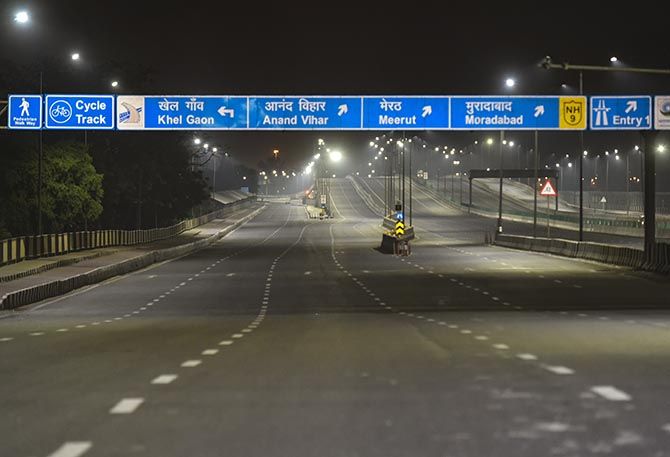'It will take six months to one year to move to normalcy, depending on how the pandemic plays out in India.'

Tata Steel cut production across its sites in the wake of restrictions to contain the spread of COVID-19.
"We were just coming out of a difficult period. So the government should ensure liquidity not just with the banks, it should be passed on to industry too," Tata Steel Managing Director and CEO T V Narendran tells Ishita Ayan Dutt.
Is it time to make the lockdown targeted?
There should be some easing without compromising on the actions being taken to contain the pandemic.
The country is too large and complex to be under complete lockdown for too long without harming economic activity irreparably.
So, while we shouldn't compromise on the health of people, a selective easing of the situation is probably required.
Do you see demand bouncing back once the lockdown is lifted?
I don't expect the lockdown to be completely lifted for some time because the battle to contain the pandemic is still on.
Things may be better than what it was in the past three weeks.
But it will take six months to one year to move to normalcy, or to where we were in January-February, depending on how the pandemic plays out in India.
Tata Steel reduced operations despite being under ESMA (the Essential Services Maintenance Act). Is that related to demand or lockdown restrictions?
The first one week was most challenging.
The main steel plant sites at Jamshedpur, Angul and Kaliganagar had the permission to operate.
But steel plants don't operate in isolation.
So, the first one week, we were focused on ensuring critical consumables come in and we were operating at 80 to 90 per cent.
Once we had the supply chain in control, we were driven by our need to optimise demand and cash.
Most of our customers like the auto firms and construction sites were closed.
We then recalibrated, optimising cash and inventory levels.
The focus was on adding value to raw materials rather than investing in buying more.
Hence, in the past 10 days, we have been operating at 50 per cent levels at key sites.
On the capex front, Tata Steel had already recalibrated expansion, what further changes are likely to be made?
Right now, we can't mobilise labour, our suppliers are not available and technicians can't come from places where we are buying equipment.
So, there will be a pause for the next few months.
We will focus on conserving cash and optimising capex.
What is the impact of the pandemic on Tata Steel Europe?
The experience in Europe is slightly different because there is no lockdown there.
There is a slowdown as some of the customers like auto companies are closed, and to that extent, there is a drop in sales.
But there are many other sectors like packaging that are continuing to take in steel.
Europe sales are at 70 per cent of normal levels and there is a view that life will start coming back to normal after Easter.
Would Tata Steel be considering job/pay cuts?
For now, we are focused on using the existing workforce productively.
We want to support everyone who is working with us directly or indirectly.
As things pan out, we will continue to look at long-term productivity, which is nothing new for us.
But we will not take any knee-jerk actions now.
Will deleveraging plans be impacted?
We need to recalibrate. But in the long-term, we will recover and do what we have to do.
What does the government need to do to get the economy back on track?
The biggest problem is liquidity, for MSMEs as well as larger businesses.
We were just coming out of a difficult period, and last year was not a great year, particularly for manufacturing.
So the government should ensure liquidity not just with the banks, it should be passed on to industry too.
The government would also need to focus on MSMEs, that are most impacted by this lockdown.
Bigger companies have the ability and flexibility to survive, but the smaller ones will need to be supported.
Next would be migrant labour.
Construction activities and manufacturing to a large extent are dependent on migrant labourers.
Government spend on infrastructure would be a good way to kick start the economy.
Liquidity, however, is the key.












 © 2025
© 2025